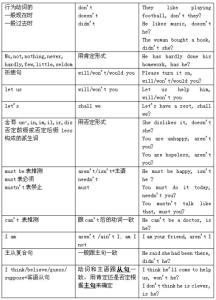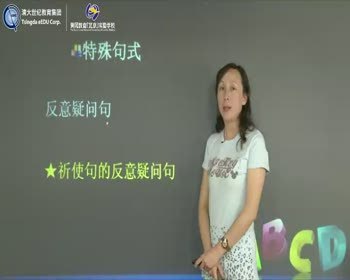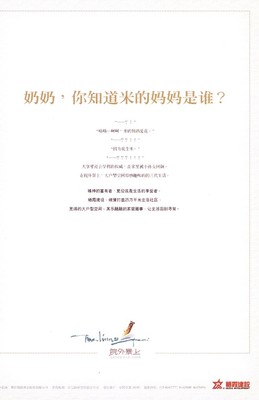学习反意疑问句要掌握3个基本要点,即否定形式必须缩写,主语必须是人称代词,结构为肯定 + 否定或否定 +肯定,但应用到各种语态和句型中却有各种变化。反意疑问句,现将反意疑问句常见的考点归纳如下:
一、考查陈述句的反意疑问句
1. 陈述部分的主语是指人的不定代词everyone, everybody, someone, nobody, no one,none, anyone, somebody等时, 反意疑问句中的主语通常用they(有时也用he)。例如:
Everyone here knows him well, doesn’t he?
Nobody could make him interested in politics, could they?
2. 陈述部分的主语是指物的不定代词(everything, nothing, something,anything等)、名词性从句、动词不定式短语或动名词时,反意疑问句的主语用it。例如:
What you want to do is to finish your work before she comes,isn’t it?
Nothing serious happened, did it?
3. 陈述部分的主语是代词these, those或名词复数时,反意疑问句中的主语必须是they;当主语是指示代词this,that或单数名词时,反意疑问句中的主语必须是it。例如:
Those are not their crops, are they?
This book belongs to Li ping, doesn’t it?
注意:主语是不定代词one时,反意疑问句的主语用one。例如:
One should be ready to help others, shouldn’t one?
4. 陈述部分带有few, little, hardly, scarcely, rarely, seldom, never,nowhere, nothing, no one,nobody等表示否定或半否定意义的词时,反意疑问句用肯定形式。注意:该句式的回答时的yes / no往往与中文意义相反,常译为:不/ 对的。例如:
—You have never been to Beijing, have you?—Yes, they have.你没到过北京,对吗?不,他们到过。
—Little food has been left, has it?
—No, it hasn’t. 没有了食物了,对吗? 对的,没有啦。
5. 陈述句部分的主谓语是I / We think(suppose, consider, believe, guess,expect, imagine等)或者I’m sure (We are sure, I’m afraid, I feel sure等)that + 宾语从句时,反意疑问句的主、谓语应与宾语从句的主、谓语相一致。例如:I’m sure you will help me,won’t you?
We think they have finished their homework, haven’t they?
注意:宾语从句如果转移了否定词,反意疑问句部分要用肯定形式。例如:
I don’t think he is a doctor, is he?
6. 陈述句部分是由and (but, so,or等)连接两个并列句时,反意疑问句的主语和谓语必须采用就近一致的原则;当陈述部分是复合句时,反意疑问句的主语和谓语必须与主句保持一致。例如:
She is a doctor but her husband isn’t a doctor, is he?
They ran out of the room when they were in danger, didn’tthey?
注意:当陈述句部分由either ... or ...,not only ... but also ..., not ...but ..., neither ... nor ...等连接并列主语时,疑问部分根据其实际逻辑意义而定。例如:
Neither you nor I am a teacher, are we?
7.陈述句部分带有前缀un-, im-, in-, dis-的否定形容词或有否定意义的动词fail, deny, miss,escape等时,此陈述句当作肯定句看待,其后的反意疑问句仍用否定形式。例如:
The students failed to pass the examination, didn’t they?
It’s illegal to drive a car without a license, isn’t it?
8. 陈述部分是there be( live, lie, stand, remain, seem to等)结构时,它的反意疑问句主语用there。例如:
There is something wrong with your bike, isn’t there?
There seems to be a heavy rain today, doesn’t there?
二、考查含有情态动词的句子的反意疑问句
1. 陈述部分带情态动词can, may, dare,need, must(必须), had better, wouldrather, would like和ought to等时,反意疑问句常用对应的情态动词。例如:
He must study hard at English, mustn’t he?
You’d better go home now, hadn’t you?
2. 如果must表示“一定,肯定”的推测意义时,反意疑问句必须与must后面的动词相呼应。例如:
You must be very tired, aren’t you?
They must have gone to the lecture, haven’t they?
Jack must have arrived here yesterday, didn’t he?
三、考查祈使句子的反意疑问句
1. 肯定意义的祈使句的反意疑问句部份用will you,有时也可以用won’t you来表达。例如:
Go home now, will you?
Close the window, please, won’t you?
2. 否定意义的祈使句的反意疑问句部分只用will you。例如:
Don’t be late again, will you?
Never forget to pay your income tax, will you?
3. Let’s开头的祈使句,在意义上包含谈话的对方在内,其反意疑问句部分往往用shall we;而Let us开头的祈使句,在意义上一般不包含谈话的对方在内,反意疑问部分句用will you。例如:
Let us have a look at your new dictionary, will you?
Let’s have a look at your new dictionary, shall we?
您现在的位置: 外语爱好者网站 >> 英语 >> 中学英语 >>正文反意疑问句常见考点小结第 2页作者:聂小涛 文章来源:中学生英语 点击数:969 更新时间:2008-5-31
四、 考查在感叹句子的反意疑问句
感叹句的反意疑问句中的主语和动词应根据具体内容而定,但一律用否定式提问。例如:
What a clever girl, isn’t she?
How beautiful the flowers are, aren’t they?
五、考查特殊句式的反意疑问句
1.陈述部分是“I’m ...”结构时,其后的反意疑问句用aren’t I。例如:
I am not seriously ill, aren’t I?
2. 陈述部分含有have(has, had), dare,
need已经成为实义(行为)动词时,反意疑问句用相应的助动词提问。例如:
She doesn’t dare to go home alone, does she?
You had a delicious breakfast this morning, didn’t you?
3. 陈述部分是“I wish ...”时,反意疑问句用may I? 表示询问或征求意见。例如:
I wish to be allowed to smoke here, may I?
4. 当陈述句含有used to 时,反意疑问句用did(也可用used):
He used to get up early, didn’t he / usedn’t he?
5. 当陈述句是以so开头的句式时,表明说话者已经知道了答案,并非要对方回答,前后保持语意一致以确认信息而已。例如:
So you don’t want to see the film, don’t you?
So he remembered to turn off the light when he left the room, didhe?
【巩固练习】
1. The news that they failed their driving test discouragedhim,______ ?
A. did theyB. didn’t they
C. did itD. didn’t it
2. Mrs. Black doesn’t believe her son is able to design digitalcamera,______ ?
A. is heB. isn’t he
C. doesn’t sheD. does she
3. Harry wouldn’t become a teacher if it hadn’t been for thetraining,______ ?
A. would heB. had it
C. would itD. had he
4. I’m sure you’d better accept his offer, ____________?
A. hadn’t youB. wouldn’t you
C. shouldn’t youD. couldn’t you
5. —You must do as I tell you.
—Oh, so I must,______ ?
A. should IB. ought I
C. mustn’t ID. must I
6. The women carrying babies, come in first,____________?
A. will youB. will they
C. don’t theyD. do you
7. What a good time we had at the party,____________?
A. hadn’t weB. didn’t we
C. had weD. did we
8. —Tom told me that he overslept this______ morning.
—Oh, he rarely used to oversleep,______ ?
A. usedn’t heB. use he
C. didn’t heD. did he
9. I don’t think he could have done such a stupid thing lastnight,______ ?
A. do IB. could I
C. did heD. has he
10. I told you that you shouldn’t waste your time playing thecomputer games,______ ?
A. didn’t IB. did I
C. should youD. shouldn’t you
11. She is unfit for the position,______ ?
A. is sheB. isn’t she
C. doesn’t sheD. does she
12. They need our help badly at the moment,____________ ?
A. needn’t theyB. need they
C. don’t theyD. do they
13. It’s a fine day. Let’s go fishing,______ ?
A. won’t weB. will we
C. don’t weD. shall we
14. Frank is working late again. This is the first time this weekhe’s had to study late,______ ?
A. isn’t heB. hasn’t it
C. hasn’t heD. isn’t it
15. —Daddy’s forgot to post the letter again,____________he?
—I’m afraid he______ .
A. has; hasB. isn’t; is
C. hasn’t; hasD. has; hasn’t
16. They must have stayed at home on holiday,______ ?
A. mustn’t theyB. haven’t they
C. didn’t theyD. must they
17. There is little we can do about it,______ ?
A. is thereB. can’t we
C. isn’t thereD. can we
18. —The problem wasn’t difficult for him,______was it ?
—______. He should have been given a ______ more difficultone.
A. No, it wasB. Yes, it was
C. Yes, it wasn’tD. No, it wasn’t
19. His wife had the carpets and the curtains cleaned,______?
A. hadn’t sheB. had she
C. didn’t sheD. did she
20. I am very interested in Mark Twain’s novels,______ ?
A. aren’t IB. am not I
C. aren’t youD. are you
Keys: 1-5 DDAAC6-10 ABDCA
11-15 BCDDC16-20 BADCA

 爱华网
爱华网


